Electric Kettle vs. Stove Kettle: Battle of Boil Masters!!
Welcome to the ultimate showdown between Electric Kettle vs Stove-top kettles- where your kitchen becomes a canvas and your choice a masterpiece. 🍵🔥🍳.
Get ready to brew- boil and brave the culinary clash as we pour ourselves into the captivating world of “electric kettle vs stove kettle”! Electric kettles are more efficient and quicker than stoves for boiling water. In addition- they are more convenient and easier to use.
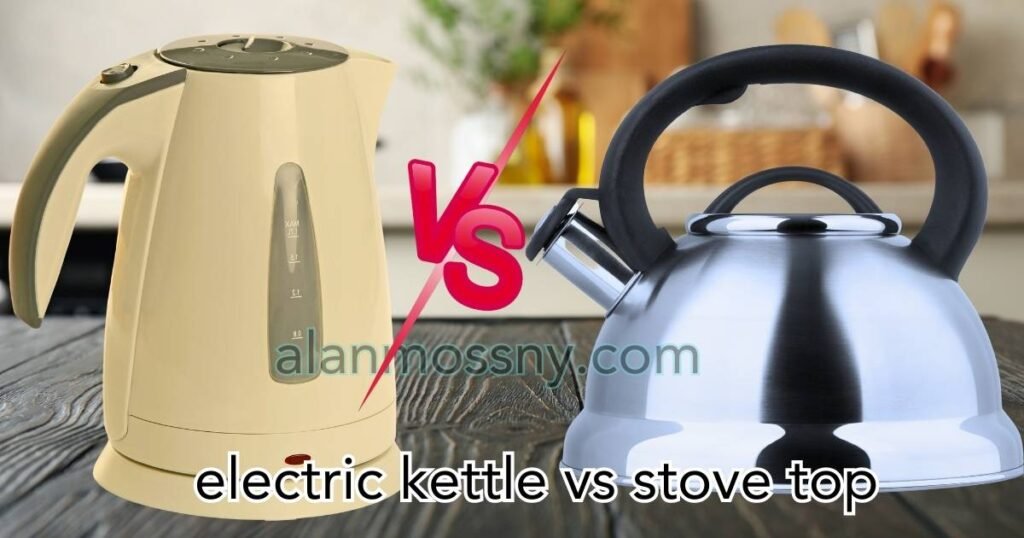
Electric kettles are a popular choice for quickly boiling water- offering greater speed and efficiency compared to traditional stoves. With their built-in heating element- electric kettles rapidly heat water to boiling point in a matter of minutes. This makes them ideal for busy individuals or those who need hot water on demand.
Furthermore- electric kettles eliminate the need for a stove- saving both time and energy. They also provide convenience with features like automatic shut-off and temperature control. Overall- electric kettles offer a convenient- time-saving and efficient solution for boiling water.🔥
Table of Contents
The Science Behind Boiling Water 🧪
Explanation Of How Water Boils And The Factors That Affect Boiling Time
Boiling water is a fundamental process that we often take for granted. But have you ever wondered what actually happens when we bring water to a boil? Let’s explore the science behind boiling water and the factors that can(indirectly or directly) affect the boiling time.🧪
- When heat is applied to water- the temperature of the water gradually increases. The water molecules begin to travel quicker and gain energy as the temperature rises.
- At a certain point- called the boiling point- the movement of water molecules becomes so rapid that they overcome the attractive forces between them. This results in the formation of bubbles- which rise to the surface and release steam.
- The boiling point of water is affected by several factors- including atmospheric pressure and the presence of impurities. Because of the decreased atmospheric pressure, water will boil (quickly) at a lower temperature at high altitudes.
- The size- shape and materials used in the container can also influence the boiling time. A wider container with a larger surface area allows for faster heat transfer and can speed up the boiling process.
- The heat source- whether it is an electric kettle or a stove- can have an impact on the boiling time. Electric kettles are mainly designed to quickly and efficiently transfer heat to the water- resulting in faster boiling times compared to stovetops.
- The initial temperature of the water can affect the boiling time as well. Cold water will take longer to boil compared to water that is already heated or at room temperature.
Importance Of Energy Transfer In The Boiling Process
Energy transfer plays one of the crucial role in the boiling process- as it is responsible for heating the water and initiating the phase change from liquid to gas. Here are some key points to consider:
- Energy transfer occurs through conduction- convection and radiation. When a heat source- such as a stove or electric kettle- is applied to the container- it transfers heat to the water through conduction.
- Convection refers to the movement of heat within the liquid itself. As the water near the heat source becomes hotter- it rises to the top while the cooler water descends- creating a convection current. This helps distribute the energy and facilitates faster boiling.
- Radiation is a form of transfer of heat via electromagnetic waves. Although less significant in the context of boiling water- radiation can contribute to energy transfer in certain cases- such as when the water is exposed to direct sunlight.
- Efficient energy transfer is essential for reducing boiling time and minimizing energy consumption. Electric kettles are designed to maximize energy transfer- utilizing heating elements that directly contact the water and quickly raise its temperature.
- In contrast- stovetops may have lower energy efficiency due to heat loss through the surrounding air. However- modern stoves are designed with features such as induction heating that improve energy transfer and enhance boiling efficiency.
Understanding the science behind boiling water and the importance of energy transfer can help us make informed choices at that time when it comes to selecting the most efficient method for boiling water.🔥 Whether you prefer the speed and convenience of an electric kettle or the traditional stovetop approach- knowing the factors that affect boiling time can make your tea or coffee brewing experience a little more fascinating.🔥
Advantages Of Electric Kettles: Lightning-Fast Boiling Magic! ⚡
Electric kettles have become a popular staple appliance in many households- providing convenience and efficiency in boiling water. They offer several advantages over traditional stovetop kettles. In this section- we will briefly explore research and find the key benefits of using electric kettles.
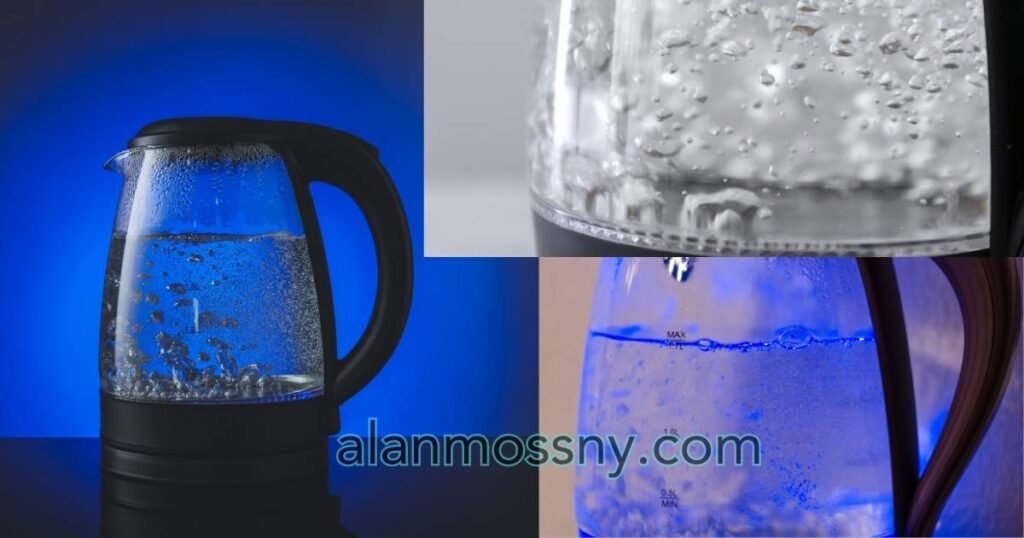
Quick Overview Of The Benefits Of Electric Kettles:
- Rapid boiling: Electric kettles are designed to heat water quickly- allowing for a speedy hot beverage or meal preparation.
- Automatic shut-off: Most electric kettles come with a built-in feature that automatically turns off the kettle once the water reaches its boiling point. This eliminates the risk of water boiling dry and potential accidents.
- Temperature control: Many electric kettles offer temperature control settings- allowing you to heat water to specific temperatures based on your needs. This is particularly useful for brewing delicate teas or making baby formula.
- Keep-warm function: Some advanced models of electric kettles come with a keep-warm feature- which maintains the water temperature for a certain period of time. This ensures that your hot beverage stays warm if you’re not ready to use it immediately.
- Cordless operation: Many electric kettles have a detachable base- making it convenient to lift and pour without having to worry with tangled cords. This feature also allows for easy filling and cleaning.
- Ease of use: Electric kettles are user-friendly- with simple controls and indicators. Filling the kettle is a breeze- as most models feature a wide mouth or a hinged lid that opens effortlessly.
- Stylish designs: Electric kettles come in a wide range of sleek and modern designs to complement any kitchen decor. They add a touch of elegance to your countertop while serving their purpose.
Energy Efficiency And Time-Saving Features: 🌟
- Energy-efficient: Electric kettles are designed to be highly efficient- using less energy compared to stovetop kettles or boiling water on a cooktop. The specialized heating elements quickly transfer heat to the water- minimizing wasted energy.
- Boiling time: Electric kettles can boil water significantly faster than stovetop kettles- saving you precious time in your daily routine. This is especially beneficial in the morning rush when you need a quick caffeine fix to start your day.
Safety Features And Convenience:🌎
- Boil-dry protection: Electric kettles often come with a safety feature (and it is really useful) that automatically shuts off the kettle if there is no water inside or if the water level drops too low. This protects the appliance from damage and reduces the risk of accidents.
- Cool-touch exteriors: Many electric kettles are designed with cool-touch housing- ensuring that the exterior remains cool to the touch even when the water inside is boiling. This reduces the risk of accidental burns.
- Cord storage: Electric kettles are often equipped with cord storage compartments or bases- keeping your countertops clutter-free and maintaining a neat appearance.
- Water level indicators: Most electric kettles have clear and easy-to-read water level indicators- allowing you to measure the exact amount of water you need for your desired beverage or recipe.
- Easy maintenance: Cleaning an electric kettle is relatively simple. With removable filters and easy access to the interior- thorough cleaning and descaling become hassle-free tasks.
Electric kettles offer a range of advantages that make them a popular choice for boiling water. From their fast boiling capabilities and temperature control features to their safety and convenience- electric kettles provide an efficient and user-friendly way to enjoy hot beverages and prepare various hot meals.🔥
So- why not consider adding an electric kettle to your kitchen essentials?
Advantages Of Stovetop kettles For Boiling Water
Quick Overview Of The Main 4 Benefits Of Using A Stovetop kettles
Using a stovetop kettle to boil water offers several advantages over an electric kettle. Let’s take a quick look at some of these benefits:🌎

Versatility and multi-purpose usage:
Unlike electric kettles- stovetop kettles provide the flexibility to perform various cooking tasks simultaneously. When using a stovetop kettle- you can easily switch between boiling water- heating other food items- or simply using multiple burners for different purposes.
Larger capacity and volume options:
stovetop kettles typically offer larger pots and pans that can accommodate a greater volume of water. This is particularly advantageous when you need to boil water for larger gatherings- such as family dinners or parties. With a stovetop- you won’t have to rely on multiple batches or refills.
Energy efficiency:
While electric kettles are known for their speed- stoves can be more energy-efficient when it comes to boiling water. Utilizing gas burners or induction cooktops- stoves can distribute heat more evenly- resulting in faster boiling times and reduced energy consumption.
Simmering and prolonged boiling:
Stoves allow for precise temperature control- enabling you to simmer and maintain a low boil for longer durations. This is especially useful when preparing delicate dishes that require gentle heat- such as stocks- soups- or teas that benefit from slow brewing.
Cost-effectiveness
Investing in a stovetop kettle may be a more cost-effective option for those who require an appliance for multiple cooking needs. Instead of purchasing separate gadgets for water boiling and cooking- a stove offers a comprehensive solution while saving on additional expenses.🔥🔥🔥
These advantages make a stovetop kettle a compelling choice for boiling water- offering both versatility and efficiency for various cooking tasks. Whether you need a larger capacity- precise temperature control- or the ability to multitask- a stovetop kettles can cater to your needs effectively.
So next time you find yourself debating between an electric kettle and a stovetop kettles- consider the numerous benefits that a stove can bring to your kitchen.🔥🍳
Comparing Boiling Time: Electric Kettle Vs Stove-top Kettles⏳
When it comes to boiling water- both electric kettles and stovetop kettles have their advantages. In this section- we will compare the average boiling times for both electric kettles and stovetop kettles- as well as explore the factors that may influence these boiling times- such as power input and heating element.

Comparison Of The Average Boiling Times For Both Electric Kettles vs Stoves:
- Electric kettle:
- Boils water significantly faster than a stovetop kettles.
- Takes an average of 3-5 minutes to bring water to a boiling point.
- An efficient heating element allows for a quicker boiling process.
- Faster boiling time is ideal for those who need hot water in a hurry.
- Stovetop kettle:
- Boiling water on a stovetop kettle takes more time compared to an electric kettle.
- The process may take around 8–10 minutes- depending on various factors.
- Slower heating due to the transfer of heat from the stove to the kettle.
- Suitable for those who don’t mind waiting a bit longer for the water to boil.
Factors That May Influence Boiling Times:
- Power input:
- Electric kettles have a higher power input- allowing for faster boiling times.
- The wattage of the electric kettle plays a major role in determining how quickly it can heat the water.
- Heating element:
- Electric kettles are designed with specific heating elements that directly contact the water- resulting in efficient heating and faster boiling times.
- On the other hand- stovetop kettles rely on heat transfer from the burner to the kettle- which can be slower and less efficient.
Electric kettles are generally more efficient and faster at boiling water compared to stovetop kettles. The heating elements in electric kettles allow for quicker heating- making them ideal for those who need hot water quickly. However- if time is not a concern and you don’t mind waiting a bit longer- using a stove to boil water can still get the job done.
Ultimately- the choice between an electric kettle and a stovetop kettles depends on 👩🍳personal preference and convenience.
Energy Efficiency: Electric Kettle Vs Stove Top🌱
Electric Kettle Vs Stove: Energy Efficiency🌱
When it comes to choosing between an electric kettle and a stove-top kettle- one important factor to consider is energy efficiency. In this section- we will compare the energy efficiency of electric kettles and stove-top kettle- discussing their energy consumption and potential cost savings.
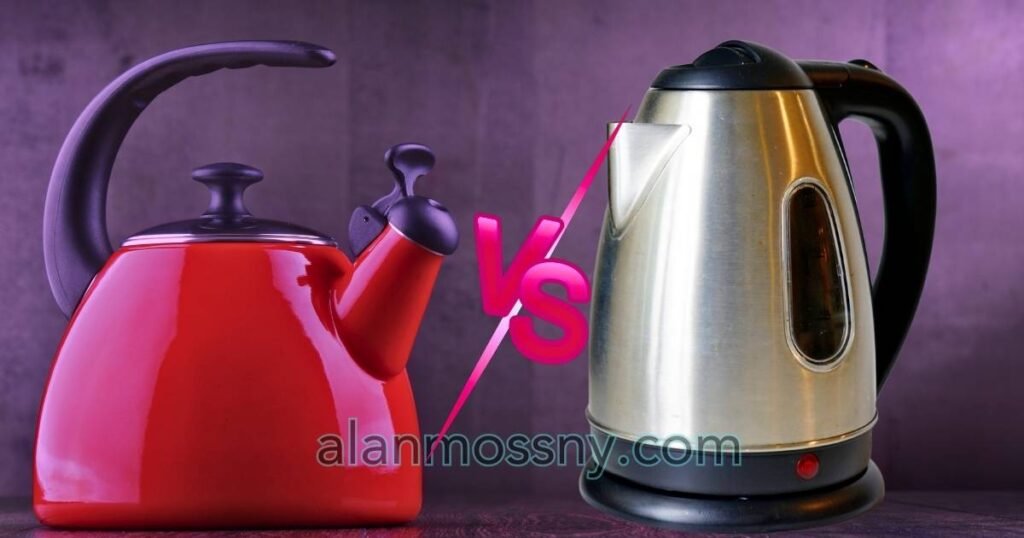
Comparison of the energy efficiency between electric kettles vs stove-top kettles:
- Electric kettles:
- Electric kettles are specifically designed for heating water quickly and efficiently.
- They use direct heat transfer to heat water- making them more energy-efficient compared to stovetop kettles.
- Most electric kettles have built-in thermostats that automatically shut off once the water reaches the desired temperature- preventing unnecessary energy consumption.
- Sove-top kettles:
- Stove-top kettles are versatile appliances that can be used for various cooking purposes- including heating water.
- However- using a stove-top kettle to boil water for making tea or coffee can be less energy-efficient compared to electric kettles.
- stove-top kettle take longer to heat water due to heat dispersion and the need to heat the entire pot rather than just the water itself.
Discussion on energy consumption and cost savings:
- Electric kettles:
- Electric kettles are main designed to heat water quickly- saving both time and energy.
- They have a specific wattage and their energy consumption depends on the amount of water being heated and the time taken to heat it.
- As electric kettles are more energy-efficient- they can help reduce electricity costs in the long run.
- stovetop kettles:
- When using a stovetop kettles to boil water- there is a higher likelihood of wasting energy due to longer heating times.
- stovetop kettles generally use more electricity or gas compared to electric kettles- resulting in higher energy consumption.
- The longer the stovetop kettles is in use- the more energy is consumed- leading to higher utility bills.
Electric kettles are generally more energy-efficient compared to stovetop kettles when it comes to heating water. Thanks to their direct heat transfer and automatic shut-off features, electric kettles save both time and energy- making them a cost-effective choice. Considering an electric kettle over a stovetop kettles is a smart and environmentally friendly choice when aiming for energy efficiency and potential cost savings.
Safety Considerations: Electric Kettle Vs Stove
Electric Kettle Vs Stove: Safety Considerations
When it comes to choosing between an electric kettle and a stovetop kettles for boiling water- safety should be a top priority. Both appliances have their own set of safety features and considerations that users need to be aware of. In this section- we will compare the safety features and precautions to take when using electric kettles and stovetop kettles.
Comparison Of Safety Features And Considerations For Electric Kettles vs stove-top kettles:
Electric kettles:
- Automatic shut-off feature: Most electric kettles are equipped with a safety feture called automatic shut-off feature that allows the kettle to shut off when the water reaches its boiling point. This prevents the water from overheating and boiling dry- reducing the risk of accidents.
- Cool-touch handle: Electric kettles are designed with a cool-touch handle even though the water within is boiling hot, it feels cold to the touch. This feature ensures that users can handle the kettle safely without the risk of burning their hands.
- Safety certifications: Look for electric kettles that have safety certifications- such as UL (underwriters laboratories) certification or CE (conformité européene) marking. These certifications indicate that the kettle has undergone rigorous testing and meets safety standards.
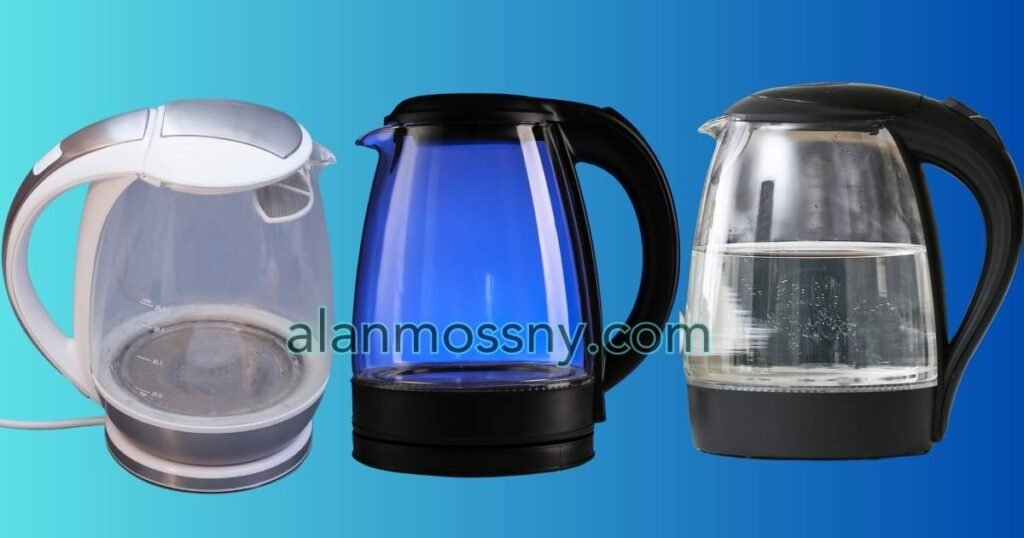
Stove-top kettles:
- Controlled heat source: Stoves provide a controlled heat source- allowing users to adjust the temperature as needed. This can help prevent water from boiling over or splattering- reducing the risk of burns or fires.
- Use proper cookware: When using a stove- it is important to use cookware that is suitable with the stovetop kettles. This means using pots or kettles with flat bottoms and stable handles to prevent tipping or spilling.
- Stay vigilant during cooking: When using a stovetop kettles- it is essential to stay attentive and avoid leaving the kitchen unattended. This helps to mitigate the risk of accidents- such as pots boiling over or flames getting out of control.
Potential Risks And Precautions To Take When Using Each Appliance:
Electric kettles:
- Beware of hot surfaces: While the cool-touch handle of an electric kettle prevents burns from handling the kettle- the external surfaces of the kettle can still become hot during the boiling process. Take caution not to touch the hot surfaces to avoid burns.
- Keep away from water: Electric kettles should be kept away far from any types of water sources to avoid electrical hazards. Ensure that the kettle is placed on a stable and dry surface when in use.
Stove-top kettles:
- Handle with care: When using a stovetop kettles- it’s important to exercise caution when handling hot kettles or pots or pans. always wear pot holders or oven mitts to protect your hands from burns.
- Watch for gas leaks: If you have a gas stove- regularly check for gas leaks by listening for hissing sounds or smelling gas. If you suspect a gas leak- turn off the stove immediately and contact a professional.

While both electric kettle vs stove-top kettles have safety measures in place- it is also important to be aware on your own from the potential risks and instantly take necessary precautions when using these appliances. By following the recommended safety guidelines- you can ensure a safe and enjoyable boiling experience with either an electric kettle vs a stove-top kettles.🍵🔥🍳
Convenience And Ease Of Use: Electric Kettle Vs Stove-top kettles🎉
Electric Kettle Vs Stove Top Kettle
When it comes to convenience and ease of use- electric kettles and stovetop kettles both have their unique features. Let’s compare the two and see which one emerges as the winner.
Comparison Of The Convenience And Ease Of Use For Electric Kettles And stove-top kettles:
Electric kettles:
- Automatic shut-off: One of the key conveniences of electric kettles is their automatic shut-off feature. This means that once the water reaches the desired temperature- the kettle switches off automatically- saving you from the hassle of monitoring and turning off the heat manually.
- Temperature control: Electric kettles often come with temperature control settings- that’s allowing you to choose the specific (as hot as you want) temperature for your hot water needs. Whether it’s boiling water for tea or warming water for baby formula- this feature ensures precise control and convenience.
- Ease of cleaning: Cleaning an electric kettle is a breeze. Most models have removable lids and wide openings- making it easy to reach every corner for thorough cleaning. Regular descaling is also simple- thanks to the availability of cleaning solutions specifically designed for electric kettles.
Stove-top kettles:
- Versatility: While electric kettles are specifically designed for boiling water- stovetop kettles offer a wider range of cooking options. From boiling- frying- sautéing- to simmering- stovetop kettles allow you to prepare a number of variety of dishes- making them more versatile than electric kettles.
- Capacity: Stovetop pots and pans generally have larger capacities compared to electric kettles. This means that if you need to boil a large quantity of water or prepare food for a larger group of people- a stovetop kettles may be a more suitable option.
- Cooking control: With stovetop kettles- you have greater control over the cooking process. You can adjust the heat levels during cooking to achieve the desired results. This level of control can be especially important for certain recipes that require precise temperature management.
Both electric kettle vs stove-top kettles offer convenience and ease of use in their own ways. Electric kettles excel in their automatic shut-off- temperature control and ease of cleaning features- making them perfect for tea lovers and those who value simplicity.🔥🔥
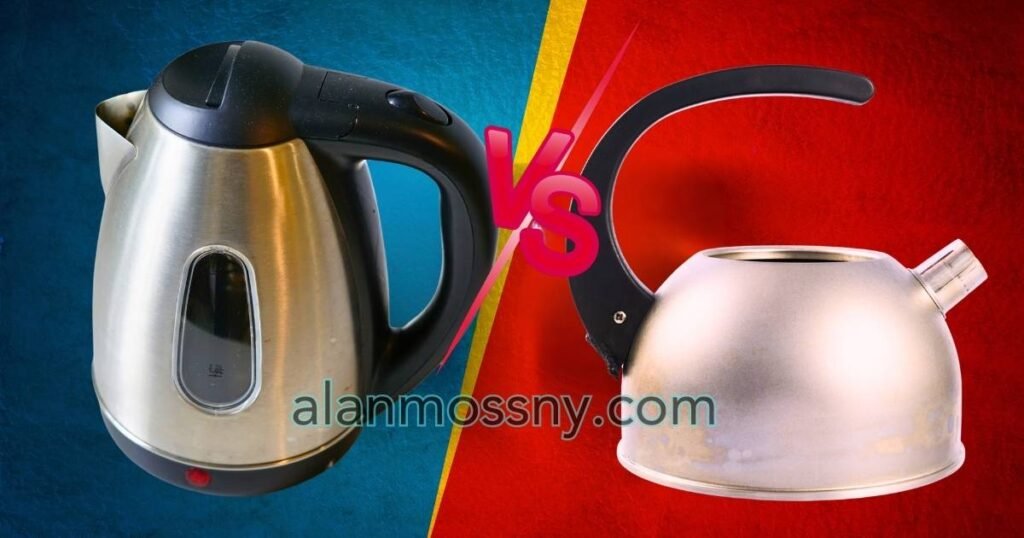
On the other hand- stoves provide versatility- larger capacity and greater cooking control- making them ideal for those who really enjoy experimenting in the kitchen. Ultimately- the choice between Electric Kettle Vs. Stove-top kettles depends on your homemaker(could be you/anyone) specific needs and preferences.🍵🔥🍳
Frequently Asked Questions Of Electric Kettle Vs Stove
Can An Electric Kettle Be Used On A Stovetop kettle?
Electric kettles are designed for use on countertops and should not be used directly on a stove.
Are Electric Kettles More Energy-Efficient Than Stovetop Kettles?
Yes, electric kettles are generally more energy-efficient than stovetop kettles as they heat water faster.
Which Is Safer To Use, An Electric Kettle Or A Stove?
Electric kettles are considered safer to use as they have built-in safety features and automatic shut-off functions.
Do Electric Kettles Boil Water Faster Than Stovetop Kettles?
Yes- electric kettles have faster boiling times compared to stovetop kettles- making them more convenient.
Are Stovetop Kettles More Durable Than Electric Kettles?
Stovetop kettles are generally more durable as they are made of qualityful stainless steel or cast iron which are sturdy materials.
Conclusion
After weighing the pros and cons of both electric kettles vs stove-top kettle – it is evident that each has its own advantages and disadvantages. Electric kettles offer convenience and efficiency with their quick boiling times and automatic shut-off feature. They are also portable- making them ideal for travelers or those with limited kitchen space.🔥
On the other hand- stovetop kettle provide more control over the heating process and can be used for a variety of cooking tasks beyond boiling water. Additionally- they are generally more durable and have a longer lifespan. Ultimately- the choice between an electric kettle and a stovetop kettle boils down to personal preference and lifestyle.🎭👩🍳 🔥 👨🍳
If you prioritize speed and convenience- an electric kettle may be the best option for you. However- if you enjoy the traditional cooking experience and value versatility- a stovetop kettle may be the way to go.
Explore More of our Engaging Articles
- If you’re looking for a deeper clean, you might want to check out our guide on Area Rug.
- If you’re interested in alternative methods, you can explore Creative Ways to Burn Incense.
- To learn more about rug quality and brands, our article on Surya Rugs Review.
- Curious about other natural remedies? Discover the Benefits of Himalayan Salt Lamps.
- If you’re experiencing issues with your salt lamp, our article on Common Salt Lamp Problems and Solutions.
- Expanding your cleaning knowledge? Our guide on Cleaning Different Types of Rugs.
- If you’re exploring kitchen appliances, you might find our comparison between Air Fryers and Toaster Ovens.
- For more cleaning tips, we’ve got you covered with Easy Ways to Clean Upholstered Furniture.
- Considering other cleaning needs? Our article on Choosing the Right Vacuum Cleaner.
- For more rug cleaning expertise- our comprehensive guide on Washing Different – Types of Rugs.

